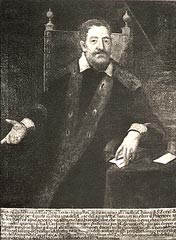Thomás Flangínis
Thomás Flangínis (grec moderne : Θωμάς Φλαγγίνης, italien : Tommaso Flangini ; 1578-1648) est un riche avocat et commerçant grec[1],[2],[3] à Venise, qui fonde le Collège Flanginien, un collège grec où nombre d'enseignants est formé[4]. Le « Collège Flanginien », fondé par Thomás Flangínis, reste un établissement renommé pendant plusieurs siècles[5].
Son père, Apóstolos Thomás, est originaire de l'île de Corfou[6], tandis que sa mère, María Flangíni, est originaire de l'île de Chypre[5],[7],[8].
Notes et références[modifier | modifier le code]
- (en) Cet article est partiellement ou en totalité issu de l’article de Wikipédia en anglais intitulé « Thomas Flanginis » (voir la liste des auteurs).
- (en) Edwina Biucchi, Simon Pilling et Keith Collie, Venice: an architectural guide, Batsford, (ISBN 0-7134-8781-X) :
« Tommaso Flangini, a wealthy Greek merchant and . in 1664 . a late entrant to the Venetian Republic's patriciate) were enclosed »
- (en) Richard John Goy, Venice: the city and its architecture, Phaidon, (ISBN 0-7148-3005-4, lire en ligne), p. 235 :
« Immediately adjacent again is the imposing Collegio Flangini...built from the legacy of Tommaso Flangini, a wealthy Greek merchant whose family had been enrolled in the Venetian patriciate in 1664; »
- (en) Steven Runciman, The Great Church in Captivity: A Study of the Patriarchate of Constantinople from the Eve of the Turkish Conquest to the Greek War of Independence, Cambridge University Press, (ISBN 0-521-31310-4, lire en ligne), p. 212 :
« In 1626 a rich Venetian Greek, Thomas Flanginis, presented the colony with a large sum of money to be spent on education; »
- (en) Steven Runciman, The Great Church in Captivity: A Study of the Patriarchate of Constantinople from the Eve of the Turkish Conquest to the Greek War of Independence, Cambridge University Press, (ISBN 0-521-31310-4, lire en ligne), p. 212
- (en) Nikiforos P. Diamandouros, Hellenism and the first Greek war of liberation (1821-1830): continuity and change, Institute for Balkan Studies, (OCLC 3734742), p. 67 :
« In 1626 a Cypriot, Thomas Flanginis, took the step of establishing in Venice what remained for about two centuries the most famous higher school established by a Greek for Greeks in Western Europe. This so-called Flangeneion school ... »
- (en) Linos Politēs, A history of modern Greek literature, Clarendon Press, (lire en ligne), p. 50
- (en) Institut für Griechisch-Römische Altertumskunde, Deutsche Akademie der Wissenschaften zu Berlin Deutsche Akademie der Wissenschaften zu Berlin, Berliner byzantinistische Arbeiten, Akademie-Verlag, (ISSN 0067-6055), p. 229 :
« Thomas Flangini. He was born at Venice In 1579 of Apostólos Thomas of Corfu, and María daughter of Vincent Flangini, of Cyprus. His father held an eminent position in the Greek Community of Venice, but left him orphan vегу soon. »
- (en) Richard John Goy, Venice: the city and its architecture, Phaidon, (ISBN 9780714830056, lire en ligne), p. 234 :
« Greek families from Venice's overseas empire were admitted to the nobility, among them the Flangini from Cyprus. »

